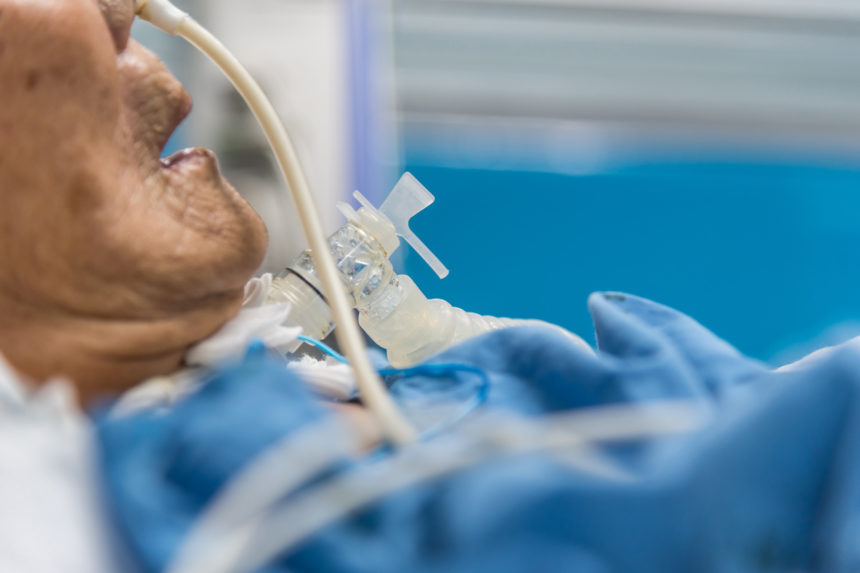
Ventilators at long-term care facilities may become the focus of hospital providers in desperate need of the machines during the coronavirus pandemic.
Many people on ventilators in nursing homes are either recovering from a brain injury or stroke, or are in a vegetative state and have been that way for years. But the pandemic has raised ethical questions about whether or not to remove long-term care patients from ventilators in order to help COVID-19 patients in hospitals, according to a report by Kaiser Health News.
A nursing home administrator in New York revealed that three hospitals approached the facility about using ventilators it wasn’t currently using. It could only grant the request to one hospital — giving away 11 machines and leaving the facility with just five for residents, according to the report.
“We left ourselves with the bare minimum,” said the administrator, who spoke on the condition of anonymity.
Hospitals in the United States have about 160,000 ventilators, while nursing homes have about 8,200. Though the federal government has about 12,700 in stockpile, experts have said worst case scenarios for the disease show that the country still may not have enough to treat patients.
While some experts don’t believe nursing homes will consider removing patients from ventilators, others believe there’s a conversation to be had.
“I severely doubt we’ll take [a hypothetical] Mrs. Smith off a ventilator because she’s 80 and has been on it for a few years and has not gotten better,” pulmonologist Michael Kalafer, M.D., told Kaiser Health.
“From an ethical point of view, for people who are not conscious, if it’s a matter of removing people from a [ventilator] who are not going to recover, I think it’s a hard decision, but one that in an emergency has to be made,” Ronald Bayer, a professor of sociomedical sciences at the Mailman School of Public Health at Columbia University, added.
Three-day stay waiver applies to all discharged patients
The Centers for Medicare & Medicaid Services reiterated during a call with providers Tuesday that its three-day stay waiver for providers doesn’t just apply to the coronavirus situation.
The waiver, which is nationwide, applies to all patients being discharged, regardless of if they’re COVID-19 patients or not, according to an attendee. They added that the waiver was aimed at helping hospitals have the maximum possible bed capacity during this emergency.
The agency also added that it’s looking to release additional guidance aimed at addressing telehealth options for therapists. The American Physical Therapy Association recently explained CMS has yet to add physical therapists, occupational therapists or speech language pathologists as eligible telehealth providers, despite its recent waiver.
In other coronavirus-related news:
• Massachusetts providers are getting additional $80 million from the state to fight coronavirus. Of that $80 million, $50 million will be designated for all nursing facilities across the state. The other $30 million will be used to support facilities that are designated COVID-19 care sites to help treat recovering patients.
Massachusetts Gov. Charlie Baker (R) and Lt. Gov. Karyn Polito (R) announced the additional funding Tuesday. In all, the state is giving healthcare providers an additional $800 million. Other changes coming include a nursing home mobile test program and a nursing home family resource line.
• The Centers for Medicare & Medicaid Services is processing requests for accelerated and advance payments in one-fifth the time it previously did, the agency said Tuesday. The time lag is now down to four to six days.
CMS approved 17,000 requests in the last week. Overall, the agency received 25,000 requests for accelerated and advance payments to providers and suppliers in little more than a week. Before the COVID-19 pandemic, CMS had approved a little more than 100 requests in the last five years, most of them related to natural disasters.
The expedited payments are considered a loan that must be paid back. Nursing homes will have up to 210 days to complete their repayment, CMS said. The funding is not a part of the $100 billion delivered by the CARES Act, which does not have to be repaid. A fact sheet on how to request accelerated/advanced payments can be found here.
• In brighter news, community members provided nursing home residents in Nebraska with a different view from their windows. A group of community members painted their windows with spring-like motifs in an effort to bring joy. In Illinois, meanwhile, nursing home employees took a similar approach in reminding people to stay home. Employees wrote various slogans across the facility, reminding others how to help seniors. One slogan read, “April distance brings May existence.”





